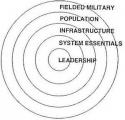The best way I can remotely answer some of that is using our (USG) creation and sustainment of a National Demining Office. It began with a a requests for projects out of State with DOD on the "who does it line". We at ground zero came up with a country plan, found the potential players and got the whole enchilada endorsed.
Enter US Army with a survey and State begins the funding process. The initial injection was pretty hefty to get the ball rolling and TDY personnel settled. Training and equipment was our first step and that meant finding the students who would eventually keep this project alive. Some folks were readily available from Rescue and the military, but we still needed many more and had to start advertising and screening. Better than a year before we had what we deemed necessary to commence training and providing equipment. We also had a ton of infrastructure problems that we had not counted on.
Two years into the project and things are rolling along smoothly (nobody has died).
Enter EUCOM and DOD funding in the form of more training and sustaining funds. This part is the hidden treasure albeit very complicated and intense documentation. We had a dedicated SNCO just to keep track of the money and equipment (also funded by the same pot).
A typical project or country plan with State starting and DOD sustaining is 5 years. Thereafter the people on the ground have to assess the status and progress based on established goals, etc. In our case we became an exporter of security vs just another consumer and that went over big at State and EUCOM. We are now in our 12th year and responsible for teaching and supporting neighboring countries as well as NATO.
I may have over simplified our project when comparing it to what you're up against, but my point was there are various avenues that fund and support. The bad news... The Embassy has to get really involved and they normally assign their most junior officer with the least amount of time in country and the most Sierra already on his plate














Bookmarks